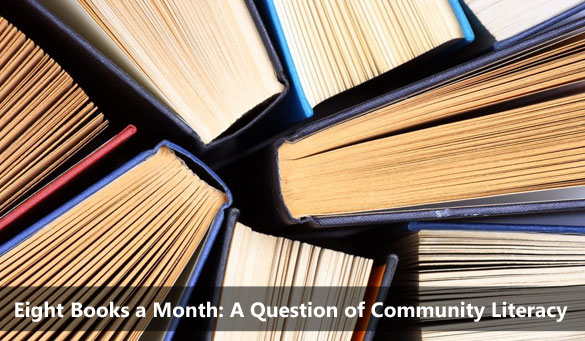Each month, my daughter’s PreK teacher sends home a reading incentive sheet: Read eight books a month, earn a free mini pizza coupon.
My first thought: Sweet! Free pizza!
But, wait … we sometimes read eight books in a day, and definitely in a week. Is eight books a month a struggle for families at our school?
At first, my thoughts go to the refugees in our community, or those living in extreme poverty, or families with abuse or neglect. But, I know middle class, high school graduates who do not read to their children regularly.
I start to wonder why.
- Access to books. Could a family not have access to eight developmentally appropriate books? It makes my heart hurt, but yes. What about the public library? While its within walking distance for those who live downtown and there is a public bus system, it is not easily accessible for all, especially with children in tow.
- Time. Twenty minutes a day is a reasonable goal, even for very busy families. Read for five minutes four times, or ten minutes two times. To read a young child eight books a month, you need to read less than five minutes a day. Can a family not have that time?
- Developmentally Appropriate Expectations. I have a master’s in Literacy Education, but it still took me about two intensive years of reading books to my kids before I found the best books for the first five years. When you read a child a book that is too old or young for him, its no surprise he isn’t engaged. Also, parents often think children must sit quietly and listen to a full story, which isn’t the case. Depending on age, children might engage in a variety of activities while listening.
- Ability and Confidence. Plenty of literate parents feel uncomfortable reading. Such adults could read wordless books or tell familiar stories in their own words, but often parents don’t believe these activities count as real reading.
- Importance placed on reading. Maine has a big initiative called Raising Readers that distributes books and information. But, is this information making its way to the families who need it? Are colorful posters really going to change people’s mindset?
Increasing literacy is about changing how a community views reading. How do we get families that haven’t valued reading or education to see its enormous importance? How do we get parents to make a priority of stopping to read or getting a library book?
Ultimately, I’m secure in my children’s literacy, but left wanting to do more for my community. I recently heard of a program in my community that pairs a volunteer and a person seeking literacy together for a year. I’m hoping to enter this program once our family schedule opens up. Helping one individual meet her literacy goals sounds rewarding, but, can we change values about reading and education other than one person at a time? Is there a way to get more of my child’s classmates reading every day?
Is literacy a problem in your community? What do you do to help encourage literacy in your community?

